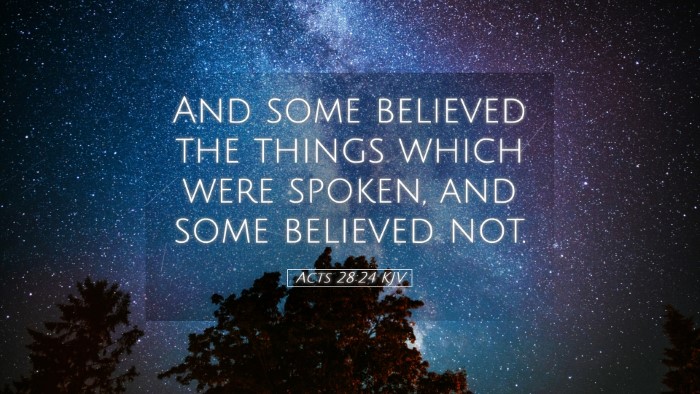Acts 28:24 – Summary and Commentary
Bible Verse: “And some believed the things which were spoken, and some believed not.” – Acts 28:24
Context of Acts 28
The final chapter of the Book of Acts recounts the Apostle Paul's journey to Rome, where he ends up under house arrest. The setting is significant as Paul has been preaching the Gospel and experiencing both acceptance and rejection. The gathering of the Jewish leaders in Rome provides a crucial backdrop for the apostolic narrative, illustrating the ongoing conflict between Jewish and Gentile believers.
Insight from Matthew Henry
Matthew Henry comments on the division of belief among those who heard Paul. He emphasizes the nature of faith and unbelief as a common human experience. Henry notes that regardless of the reception, Paul remained steadfast, demonstrating the persistence of the Gospel message. He asserts that while some accepted the truth of Christ's resurrection and lordship, others rejected it, highlighting the dichotomy that characterizes the ministry of the Gospel.
- Belief and Unbelief: Henry underscores that belief in the Gospel is a significant theological point, wherein acceptance leads to spiritual transformation, while disbelief results in spiritual barrenness.
- God’s Sovereignty: The differing responses are not random; they play into God's sovereign plan. Henry suggests that this division serves to fulfill biblical prophecy and illustrates the rejection of Christ by His own people.
Insights from Albert Barnes
Albert Barnes elaborates on the implications of belief and unbelief in this passage. He points out that the disparate responses reveal the theme of God’s providential work through human agency. Barnes states that even as Paul preaches, the human heart's condition dictates its response to the truth.
- The Power of Preaching: Barnes emphasizes that the proclamation of the Gospel has inherent power. The varying responses confirm the idea that while God calls everyone through His word, individuals often respond differently based on their hearts.
- Jewish Rejection: He notes the significance of Jewish leaders in rejecting the message, which was foreshadowed throughout the Gospels and serves as a critical turning point for the early church's expansion to the Gentiles.
Thoughts from Adam Clarke
Adam Clarke's commentary additionally enhances the understanding of Acts 28:24 by exploring the sociocultural dynamics present at the time. Clarke calls attention to why some believed while others did not, attributing this to various factors including preconceived notions, cultural heritage, and individual readiness to receive a new message.
- Human Resistance: Clarke discusses the tendency of individuals to cling to their beliefs despite persuasive arguments. This illustrates a broader truth about human nature and the challenges of evangelism.
- Cultural Dispositions: He comments on the Jewish leaders’ expectations of the Messiah and how these expectations conflicted with the reality presented by Paul, leading to skepticism and resistance.
Theological Implications
This verse not only provides insight into the immediate context of early Christian preaching but also speaks to broader theological truths about faith, revelation, and human agency in salvation. It encapsulates the struggle between divine sovereignty and human free will.
- Faith as a Response: The belief or unbelief that arises from hearing the Gospel emphasizes that faith is a response to divine revelation, shaped by the individual's openness to God.
- God’s Revelation: The verse indicates a continuing truth about God’s self-revelation: He speaks through His word, and though it is clear to some, others turn away, affirming the necessity of earnest prayer for the illumination of hearts.
Conclusion
Acts 28:24 captures a pivotal moment in the early Church, reflecting broader themes of belief, rejection, and the nature of divine communication. The insights drawn from public domain commentaries, including those of Matthew Henry, Albert Barnes, and Adam Clarke, provide a rich tapestry of understanding that speaks not only to the specific historical moment but also to ongoing conversations about evangelism and reception of the Gospel.
For pastors, students, and theologians, this passage serves as a reminder of the persistent need for clarity in the Gospel message and the importance of both proclaiming and modeling belief amidst an often skeptical world.


